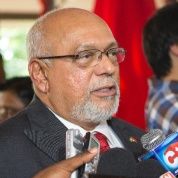Guyanese voters will head to the polls Monday to elect their country’s next presidential leader.

Around 570,000 registered voters will head to over 2,000 polling stations set up across the country, with voting opening 6:00 am and closing at 6:00 pm local time, according to the Guyana Elections Commission (GECOM).
The Guyanese people, who gained independence from the United Kingdom in 1966, have roots in India, Africa and the Americas and have traditionally cast their ballots along racial lines.
The historic racial division in politics between the Afro-Guyanese community, which represents approximately 30 percent of the population and the larger Indo-Guyanese comprising some 43.4 percent, is still present in the country’s politics.
In November 2011, current President Donald Ramotar of the ruling People's Progressive Party/Civic (PPP-C) secured a fifth successive term in office for the party, but failed to secure a majority in parliament.
Elections will be held on May 11 after Ramotar suspended parliament on Nov. 10, following attempts by the opposition coalition to force a snap election through a no confidence vote against Ramotar’s minority government.
Former army commander David Granger, of the largely Afro-Guyanese People's National Congress (PNC) formed a five-party alliance known as A Partnership for National Unity (APNU) that has emerged as a formidable political opposition.
The latest opinion polls, however, the APNU-AFC alliance still has more to do to persuade the electorate.
According to a poll in early March conducted by the North American Caribbean Teachers Association (Nacta), 51 percent of respondents say they are better off under the PPP/C administration, although voting is still predominantly split along racial lines.
Read More: Guyana Remains Firmly with PetroCaribe
In addition to its demographic advantage, the PPP/C government can also point to a relatively effective economic record.
While, the Caribbean region as a whole, experienced slow growth in 2014 only growing by 1.9 percent, Guyana’s economy grew by 4.5 per cent, according to estimates by the by Economic Comission for Latin America and the Caribean (ECLAC).
The PPC/ has also achieved improvements in health, education, housing and infrastructure to Guyana, where 43 percent of the population lives below the poverty line.
Read More: Guyana Forms Mental Health Ministry to Fight Suicide